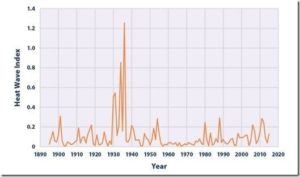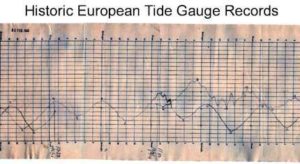by Clyde Spencer, Sep. 6, 2019 in WUWT
Abstract
Tmax and Tmin time-series are examined to look for historical, empirical evidence to support the claim that heat waves will become more frequent, of longer duration, and with higher temperatures than in the past. The two primary parameters examined are the coefficient of variation and the difference between Tmax and Tmin. There have been periods in the past when heat waves were more common. However, for nearly the last 30 years, there has been a reversal of the correlation of increasing CO2 concentration with the Tmax coefficient of variation. The reversal in differences in Tmax and Tmin indicate something notable happened around 1990.
Introduction
There was much in the press this Summer about the ‘global’ heat waves, particularly in France and Greenland. For an example of some of the pronouncements, see here. The predictions are that we should expect to see heat waves that are more frequent and more severe because of Anthropogenic Global Warming, now more commonly called “Climate Change.” The basis for the claim is unvalidated Global Climate Models, which are generally accepted to be running to warm. The simplistic rationale is that as the nights cool less, it takes less heating the next day to reach unusually high temperatures. Unfortunately, were that true, that would lead one to conclude that heat waves should never stop.
…

Fig. 1. U.S. Annual Heat Wave Index, 1895-2015
https://www.epa.gov/climate-indicators/climate-change-indicators-high-and-low-temperatures
If the predictions of worse future heat waves were valid, one might expect to be able to discern a change occurring already, inasmuch as it is commonly accepted that Earth has been warming at least since the beginning of the Industrial Revolution
by Kip Hansen, Sep. 6, 2019 in WUWT
I have been working on another sea level related essay and in the process stumbled upon a paper published in 1990 by thePermanent Service for Mean Sea Level (PSMSL). The title is: “On The Availability Of European Mean Sea Level Data by P.L. Woodworth, N.E. Spencer and G. Alcock (1990)”, The paper is listed on the PSMSL page of “Publications Relevant to the PSMSL and GLOSS” but is not available there. [ a .pdf is available here courtesy of the library at the University of New Brunswick, Canada ].
…

…
by J. Van Vliet, Sep. 5, 2019 in ScienceClimatEnergie
Belgium and France were recently affected by an extreme heat wave that took place between 24 and 27 July 2019. This heat wave was in many aspects presented as unprecedented and it has therefore unlocked a large scale reaction by many media. After a few days to cool down, the time has come to express a non-emotional and non-political opinion about such a strong heat wave.
Emotional reactions were normal in such circumstances: the temperatures were extreme and even if France and Belgium were much better prepared that for the 2003 heat wave, the present heat wave has led to important suffering for many poor people or people in bad health and without access to air conditioning.
The heat wave unlocked also many political reactions: it was an opportunity to press once more the threatening mantra of United Nations[1] and IPCC that mankind is responsible for this catastrophic warming and is destroying its own and only planet. A whole caste of politicians, countless academics and so-called “experts”, lobbyists, bureaucrats and NGOs claim that it is urgent to take “strong” measures going up to the replacement of democracy by climatist[2] despotism: even children are enlisted in the political arena. These people number in hundreds of thousands and probably more and they communicate loudly and repeatedly at the UN, through IPCC reports and COP events, in the media and in the streets. Does this imply they are right ? Has mankind something to do with these high temperatures ?
…
…
La géologie, une science plus que passionnante … et diverse


